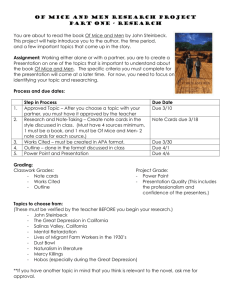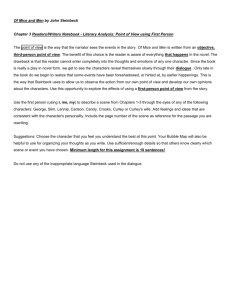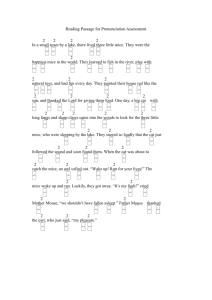OF MICE AND MEN John Steinbeck
advertisement
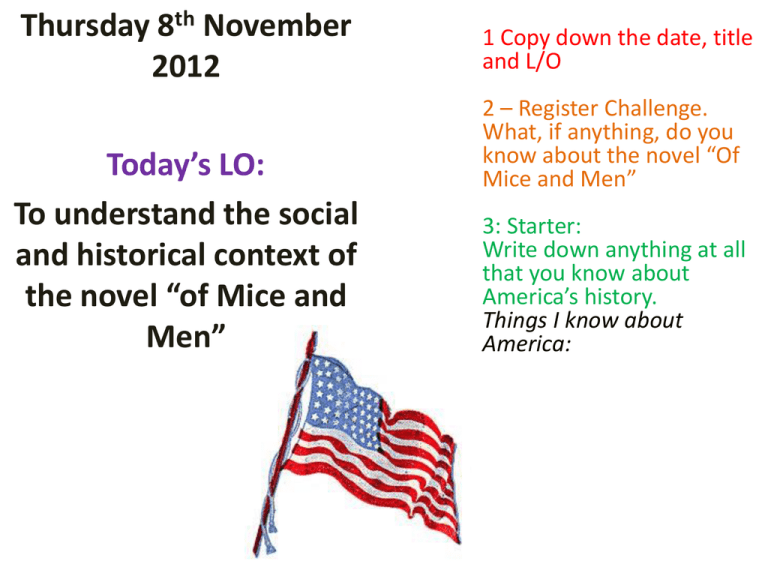
Thursday 8th November 2012 Today’s LO: To understand the social and historical context of the novel “of Mice and Men” 1 Copy down the date, title and L/O 2 – Register Challenge. What, if anything, do you know about the novel “Of Mice and Men” 3: Starter: Write down anything at all that you know about America’s history. Things I know about America: Why is context important? What does this article tell us about society today? Context: An introduction to 1920s America SOCIAL, HISTORICAL AND CULTURAL CONTEXT. A time of massive change in the world! The Roaring Twenties Read the extract from The Great Gatsby by F. Scott Fitzgerald. It was first published in 1925, twelve years before Steinbeck’s Of Mice and Men. The novel is set in New York during the Roaring Twenties. Stick in your book …The bar is in full swing, and floating rounds of cocktails permeate the garden outside, until the air is alive with chatter and laughter, and casual innuendo and introductions forgotten on the spot, and enthusiastic meetings between women who never knew each other's names. The lights grow brighter as the earth lurches away from the sun, and now the orchestra is playing yellow cocktail music, and the opera of voices pitches a key lighter. Laughter is easier minute by minute, spilled with prodigality, tipped out at a cheerful word. The groups change more swiftly, swell with new arrivals, dissolve and form in the same breath; already there are wanderers, confident girls who weave here and there among the stouter and more stable, become for a sharp, joyous moment the centre of a group, and then, excited with triumph, glide on through the sea-change of faces and voices with colour under the constantly changing light. TASK: What were the ‘Roaring Twenties’ like? Highlight sections from the extract that you feel capture the spirit and mood of 1920s America and make a note of your ideas alongside the highlighted sections. Suddenly one of these gypsies, in trembling opal, seizes a cocktail out of the air, dumps it down for courage and, moving her hands like Frisco, dances out alone on the canvas platform. A momentary hush; the orchestra leader varies his rhythm obligingly for her, and there is a burst of chatter as the erroneous news goes around that she is Gilda Gray's understudy from the Follies. The party has begun. Life in the 1920s 1930s: Life Changed What words does this newspaper use to show how bad the situation was? THE GREAT DEPRESSION! • On Black Tuesday, October 29, 1929, the stock market crashed, triggering the Great Depression, the worst economic collapse in the history of the modern industrial world. • It spread from the United States to the rest of the world, lasting from the end of 1929 until the early 1940s. With banks failing and businesses closing, more than 15 million Americans (one-quarter of the workforce) became unemployed. Watch this short clip 1. What was life like in America after the Wall Street Crash? 2. Why were so many of them queuing? 3. What kind of work were the men looking for? 4. How would you describe their lives? Historical Context The depression also led to a drop in the market price of farm crops, which meant that farmers were forced to produce more goods in order to earn the same amount of money. THE FARMERS To make matters worse, America was also hit by a series of droughts and many farms could no longer operate. How would the droughts mean there was more unemployment? The Dust Bowl • The increase in farming activity across the Great Plains states caused the precious soil to erode. • This erosion, coupled with a seven-year drought that began in 1931, turned once fertile grasslands into a ‘desert like’ region known as the Dust Bowl. Dust Bowl Plains WHAT DID PEOPLE DO?. People heard that, in California, the soil was still good and there was plenty of room and opportunity for work. If you were a farmer from Oklahoma in the 1930s what would you do? The History of Migrant Farmers in California –During the Great Depression, economic and ecological forces (the Dust Bowl) brought many rural poor and migrant agricultural workers from the Great Plains states, such as Oklahoma, Texas, and Kansas, to California. The American Dream… • Hundreds of thousands • The state’s mild climate promised a longer of farmers packed up growing season and, their families and few with soil favourable to a belongings, and headed wider range of crops, it for California, which, offered more for numerous reasons, opportunities to seemed like a promised harvest. land. … is shattered!! • Despite these promises, though, very few found it to be the land of opportunity and plenty of which they dreamed. Mini Plenary Making predictions: Consider what we have looked at and discussed this lesson. This is the America that the novella ‘Of Mice and Men’ is set in. Look at the image of a front cover What do you think this novella will be about? Write down three statements. What is the American Dream? • America has always been seen as the Land of Opportunity, partly because immigrants from Europe saw it as a place of freedom, a place to begin a new life, a place for real possibilities and wealth for all. • This belief in America as a country where ordinary people could create a better life for themselves is often referred to as “The American Dream”. • From the 17th century, where the 1st settlers arrived, immigrants dreamed of a better life in America. • People went there to escape from persecution, to make a new life for themselves and their families. • For many the dream became a nightmare with the horrors of slavery, of the American Civil War, the growth of the slums and the corruption of the government. This led to many shattered hopes • For many the dream ended with the Wall Street crash in 1929. Historical Timeline The ‘New Deal’ support for unemployment. Banks, Factories close, farming collapses 1929 Financial Crash 1931 1933 Franklin D. Roosevelt becomes president. 1936 1937 Of Mice and Men is published. Of Mice and Men Look up the following words in the dictionary and write their definition:– Itinerant – Junctures – Debris – Morosely – Brusquely About The Author • John Steinbeck was born in 1902 in Salinas, California, a region that became the setting for much of his fiction, including Of Mice and Men. • As a teenager, he spent his summers working as a hired hand on neighbouring ranches, where his experiences of rural California and its people impressed him deeply. John Steinbeck • He wrote the book ‘ Of Mice and Men’ in 1936 • Like ‘Of Mice and Men’ many of his books deal with the lives and problems of working people. • Many of his characters in his books are immigrants who went to California looking for work or a better life. American Dream in Of Mice and Men • Steinbeck wanted to explore the themes of power, ownership and control and their effect upon ordinary people. • Those people strived for a better life, and had hopes and dreams • The two main characters, Lennie and George’s dream is significant because it tells us something about the culture that has created them. Write this in your books: Steinbeck's novels can all be classified as, “social novels dealing with the economic problems of rural labour.” The Title The title comes from a poem by a Scottish poet Robert Burns. ‘The best laid schemes o’ mice and men Gang aft agley (often go wrong) And leave us nought but grief and pain For promised joy!’ Inspired by a poem written by Robert Burns:- So Why The The Titlebest-laid Of Mice and Men? • From the poem: schemes o' mice an 'men / Gang aft agley • Meaning: No matter how hard or well we plan for something, our plans can often fail to become reality...or worse, they can end up going terribly wrong. What 3 predictions can you make about the book from this poem alone? Write them down. 1. 2. 3. • Although Of Mice and Men is a fictional story Factinor Fiction? it is deeply rooted historical fact. • The high unemployment resulted in many people travelling to find work. • They could be hired and fired at the boss’ will (farm owners were very powerful) In pairs, discuss what you think John Steinbeck means by this quote: “The writer is delegated to declare and to celebrate man's proven capacity for greatness of heart and spirit - for gallantry in defeat, for courage, compassion and love. I hold that a writer who does not believe in the perfectibility of man has no dedication nor any membership in literature.”
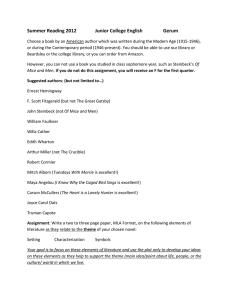
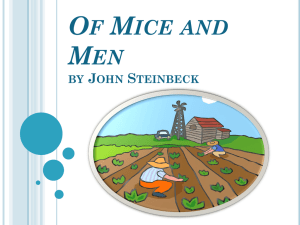
![Historical_politcal_background_(intro)[1]](http://s2.studylib.net/store/data/005222460_1-479b8dcb7799e13bea2e28f4fa4bf82a-300x300.png)
